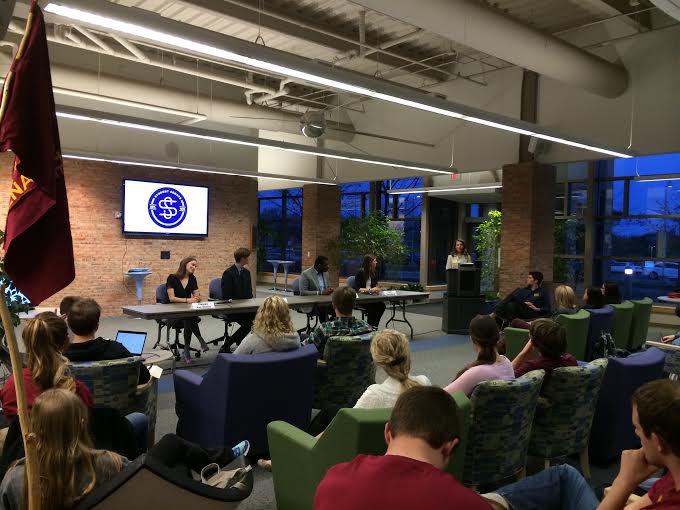On Tuesday night, the DeVos Center was home to the 83rd annual student senate debate. The well-attended event featured two executive teams running for the top position while also showcasing the two candidates for vice president and 10 student senator candidates.
Moderated by Alicia Smit, the current executive vice president and chair of the election committee, both teams tackled questions presented by both Smit and the audience. Each team representative had 90 seconds to respond to a question each round while the other had the same amount of time to respond to what the first team had to say.
The first question asked both candidates to explain why they were running for senate. A coin toss favoring the team consisting of Sam Schuiteman and Maggie Van Winkle paved the way for the first response. Schuiteman and Van Winkle focused their campaign on three main points.
According to Schuiteman, their team aimed to “expand and build upon senate’s static programs (take your prof out, rent-a-bike program), expand student governance committees (continue to train students on committees) and continue to build student senate and outreach.”
The second executive team, consisting of Jonathan Eigege and Laura Sterenberg, proceeded to explain their goals. “Senate needs to refocus both internally and externally; internally, people in senate need to be there for the right reasons and externally, we need to focus on students’ needs,” said Eigege. “We also want to reconnect with students, making sure that their feelings are being represented.”
They also emphasized “reaction” where senate would “make sure that we use what we hear from you and act on your behalf,” according to Sterenberg.
When asked about their vision for the student body, the teams believed in improving the experience of individual students at Calvin in a variety of ways.
Eigege and Sterenberg’s team emphasized diversity.
“We are going to make sure that people who have interests that are not mainstream are actually thriving at Calvin,” said Eigege. “An important way to do that is through student organizations and using student organizations and various interest groups on campus to lead. The problem at Calvin is not a lack of leadership, as we can see from the competition to be OLs and RAs; the problem is a lack of inclusion.”
Schuiteman and Van Winkle’s team believed that students should pursue their passions.
“We want students to be in an environment where people can take what they love and develop it fully,” said Schuiteman. “Senate can be a great job building a voice in that. If you can’t completely develop what you’re passionate about, student senate should be there for you.”
Representatives from both teams also agreed that the financial struggle was one of the biggest concerns for the student body.
“We need to think about ways we are spending our money and our time. We need to know what is important, what things are necessary for the Calvin community,” said Sterenberg.
Both teams were also asked questions on topics ranging from their thoughts on the core curriculum, the marijuana policy at Calvin and extending library hours to Sunday.
Audience members were also given the chance to ask questions, which included questions about cutting the art department, what student senate actually does and how the budget is allocated.
Smit expressed satisfaction at the way the debate turned out. “I’m thrilled about the turnout. It was exciting to see it from this end. More importantly, I thought the candidates did great. It takes a lot of courage to put yourself out there in front of this many people, and not only did they do that, but they did that really well.”
Van Winkle agreed. “I think that this year’s debate really stepped it up. This year’s senate did a great job of moderating — the questions were fair and both teams did really well.”
Following the debate, some students made their decision based on the team’s oral communication skills.
“When voting for senators or politicians, a lot of people don’t look at what they say but how they say them,” said senior Colton Credelle. “It’s about how well people articulate themselves and how well people are able to speak about what they believe in, and that’s a main factor of who they vote for.”
For junior Khushboo Gulabrai, this factor contributed towards her decision to support Eigege and Sterenberg. “I think they expressed themselves better. Jona and Laura presented themselves in a way that was more relatable and personable,” said Gulabrai.
Senior Mary Van Poolen responded to what she saw as ignorance in one of the questions directed at the candidates, regarding what student senate does currently.
“I just felt like it was a little rude,” said Van Poolen. “Often politicians are targeted because they are scapegoats, but there’s always going to be issues and to say that senate doesn’t do anything is a little ignorant, because there’s so much that goes on that people just don’t realize.”
Both teams are now looking forward to the election on Thursday. Schuiteman sums up his feelings on the election: “We’re excited for one final day.”








